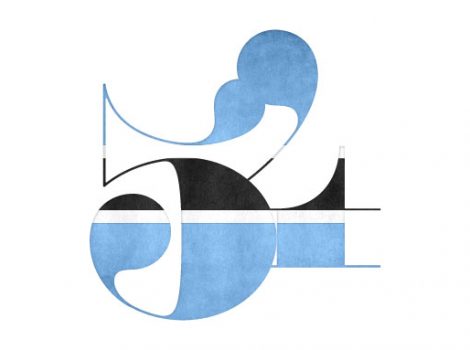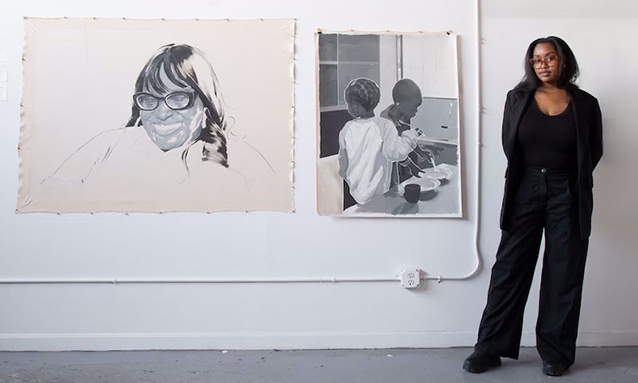
15 February 2024
Artist Louise Mandumbwa‘s family has been relocating for generations across Africa, and the painter and printmaker from Botswana has herself been moving across the United States for a decade in pursuit of her art that explores the meaning of home.
This winter term, Mandumbwa, 28, is in Ashland, serving as Southern Oregon University’s visiting artist and scholar in teaching. It’s the farthest West she’s been in North America; last week, a snowstorm smothered roads and closed classrooms. On Monday, Feb. 10, however, she was back in SOU’s art building, across from the Schneider Museum of Art, demonstrating a printmaking technique that requires the image or matrix made of aluminium to be etched in Coca-Cola.
It’s not unusual for Mandumbwa to use common materials in artistic ways. She employed cement to depict wheat-paste flyers layered on public walls, the information worn away with time. Charcoal and oil paints may also be used, but still, her images seem fleeting, as if they are dematerialising before a viewer’s eyes. What fades and what endures fascinates her.
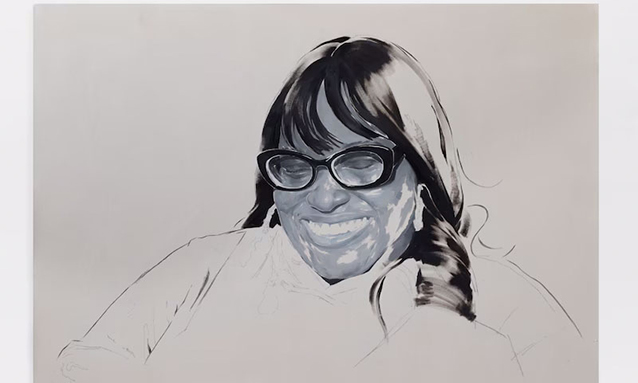
Her portraits, which have been described as evoking feelings of warmth, familiarity and longing, often include a mystery: a puzzle piece left blank. She explains that the area left white represents what she doesn’t know about the person she’s portraying.
“Always meaningful are what viewers share of the people they love and are reminded of by my works, and what home feels like for them,” said Mandumbwa.
She was born in Francistown, Botswana, in 1996, into a multilingual family whose extended members spoke Portuguese, French, English and the African vernacular languages of Mbundu, Luvale, Nyanja and Bemba. She moved to the U.S. in 2015 and earned a Bachelor of Fine Arts degree in painting from the University of Central Arkansas and a Master of Fine Arts in painting and printmaking from Yale University in Connecticut.
“Much of my work is an excavation of stories I hold dear,” she said, “but they are driven by underlying ideas of home, history and collective memory that everyone has their own relationships with.”
Sometimes, she said, people want to return to a place that only now exists in memory. On a journey to conduct research for her thesis, Mandumbwa visited a remote village where her father was raised near the Angola and Zambia border. There, she learned the homes that had been crafted of unfired clay had not remained as her father recalled and many had become part of the earth again, replaced with newer structures.
What had survived of the place her father knew were the trees he climbed 40 years before, and tidy plots of land still used to grow corn, yucca and sugarcane. Scott Malbaurn, executive director of the Schneider Museum who invited Mandumbwa to teach for 11 weeks in Ashland, said,
“Louise is not only a talented artist but a kind soul who shares her life story as well as the story of her family.”
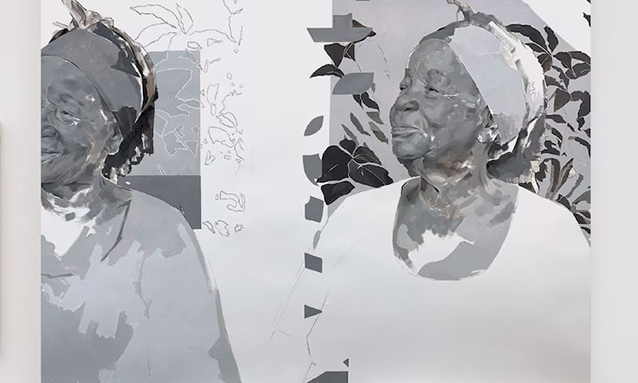
During an artist lecture Mandumbwa presented on campus Jan. 23, she spoke of an earlier artwork inspired by a woven plastic laundry bag, which she described as “the object of choice for immigrant communities that had to whittle down a lifetime of belongings into what they could carry.” The inexpensive large sacks the African diaspora calls “Ghana must go” or “Zimbabwe bags” are piled into buses and in the backs of pickup trucks, and “almost invariably pointed to upheaval and migration,” she said.
On canvas, she designed a checkered textile and on its strap are words from poet Ijeoma Umebinyuo: “And so here you are too foreign for home, too foreign for here, never enough for both.”
At the lecture, Mandumbwa told the audience that a person’s origins are an important part of their identity, and yet, multiple moves across multiple countries over decades have left her family without a tangible archive that speaks to their origin.
“The idea of ‘home’ was one in flux,” she said.
Malbaurn said Mandumbwa examining her identity through her artworks and interpersonal relationships results in “an artist who is truly inspiring and towers above any one place and form of identity.”
He added:
“Because Louise is the daughter and granddaughter of intra-continental immigrants from Zambia, Angola and the Congo, … Louise is not bound to one.”
Lily McGoffin, a Southern Oregon University junior double majoring in fine art and psychology, is enrolled in Mandumbwa’s intermediate printmaking class. McGoffin said she’s learning a lot from the artist, who is helpful in the studio and finding solutions to the many challenges of the printmaking process.
“Louise has a deep knowledge of various printmaking techniques,” said McGoffin, “and she excels at clearly explaining the detailed, step-by-step processes involved.”
Mandumbwa’s teaching schedule allows her time in the studio for her work. She sees the SOU position as an opportunity to meet Ashland’s art community, but also to help her define the balance between her artistic practice and a more sustained commitment to working as an educator.
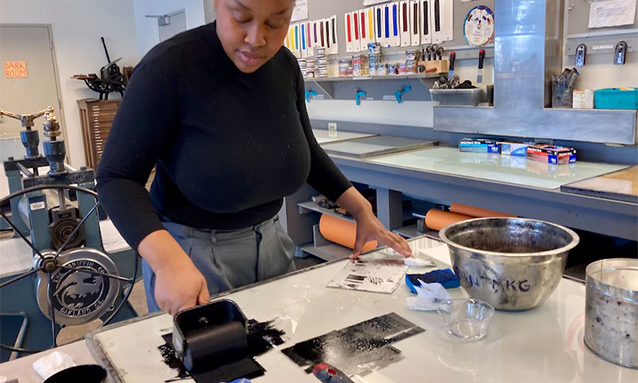
Mandumbwa will return to her home in Connecticut in late March. The message she wants to impart: Her conversations and observation on two continents have shown her that many experiences and responses are universal.
“I’ve enjoyed hearing how the people who call this place home speak of how they know Ashland, and that informs how I am coming to know it in my time here,” she said.
“I look forward to seeing how my experiences in this place,” she continued, “will ripple forward and influence my practice in the months to come.”
Source: https://rb.gy/1d8dt1


